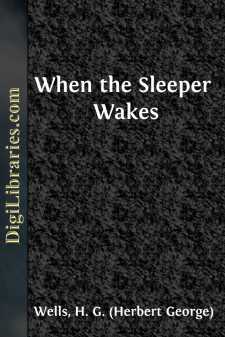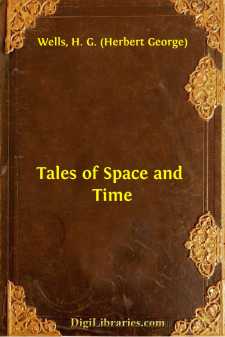Categories
- Antiques & Collectibles 13
- Architecture 36
- Art 48
- Bibles 22
- Biography & Autobiography 813
- Body, Mind & Spirit 142
- Business & Economics 28
- Children's Books 16
- Children's Fiction 13
- Computers 4
- Cooking 94
- Crafts & Hobbies 4
- Drama 346
- Education 46
- Family & Relationships 57
- Fiction 11829
- Games 19
- Gardening 17
- Health & Fitness 34
- History 1377
- House & Home 1
- Humor 147
- Juvenile Fiction 1873
- Juvenile Nonfiction 202
- Language Arts & Disciplines 88
- Law 16
- Literary Collections 686
- Literary Criticism 179
- Mathematics 13
- Medical 41
- Music 40
- Nature 179
- Non-Classifiable 1768
- Performing Arts 7
- Periodicals 1453
- Philosophy 64
- Photography 2
- Poetry 896
- Political Science 203
- Psychology 42
- Reference 154
- Religion 513
- Science 126
- Self-Help 84
- Social Science 81
- Sports & Recreation 34
- Study Aids 3
- Technology & Engineering 59
- Transportation 23
- Travel 463
- True Crime 29
H. G. (Herbert George) Wells
Herbert George Wells, commonly known as H.G. Wells, was an English writer renowned for his pioneering works in science fiction, such as "The War of the Worlds," "The Time Machine," and "The Invisible Man." Born in 1866, Wells was also a prolific social commentator and historian, whose writings often explored the impact of science and technology on society. His literary contributions have left a lasting legacy, influencing numerous authors and the genre of science fiction as a whole.
Author's Books:
Sort by:
In the year 1884 I was invited to give tuition by correspondence, in Biology. Although disposed at the time to ridicule the idea of imparting instruction in natural science by letter, I gladly accepted the opportunity thus afforded me of ascertaining for myself what could and could not be accomplished in that direction. Anyone familiar with the scope of biological enquiry, and the methods of biological...
more...
CHAPTER I. INSOMNIA One afternoon, at low water, Mr. Isbister, a young artist lodging at Boscastle, walked from that place to the picturesque cove of Pentargen, desiring to examine the caves there. Halfway down the precipitous path to the Pentargen beach he came suddenly upon a man sitting in an attitude of profound distress beneath a projecting mass of rock. The hands of this man hung limply over his...
more...
THE CRYSTAL EGG There was, until a year ago, a little and very grimy-looking shop near Seven Dials, over which, in weather-worn yellow lettering, the name of "C. Cave, Naturalist and Dealer in Antiquities," was inscribed. The contents of its window were curiously variegated. They comprised some elephant tusks and an imperfect set of chessmen, beads and weapons, a box of eyes, two skulls of...
more...
I. THE PRINCIPAL CHARACTER IN THE STORY If you (presuming you are of the sex that does such things)—if you had gone into the Drapery Emporium—which is really only magnificent for shop—of Messrs. Antrobus & Co.—a perfectly fictitious "Co.," by the bye—of Putney, on the 14th of August, 1895, had turned to the right-hand side, where the blocks of white linen and piles of blankets...
more...
CHAPTER I. INTRODUCES MR. LEWISHAM. The opening chapter does not concern itself with Love—indeed that antagonist does not certainly appear until the third—and Mr. Lewisham is seen at his studies. It was ten years ago, and in those days he was assistant master in the Whortley Proprietary School, Whortley, Sussex, and his wages were forty pounds a year, out of which he had to afford fifteen shillings...
more...
I want very much to set down my thoughts and my experiences of life. I want to do so now that I have come to middle age and now that my attitudes are all defined and my personal drama worked out I feel that the toil of writing and reconsideration may help to clear and fix many things that remain a little uncertain in my thoughts because they have never been fully stated, and I want to discover any...
more...
Miriam I It is an illogical consequence of one human being’s ill-treatment that we should fly immediately to another, but that is the way with us. It seemed to Mr. Polly that only a human touch could assuage the smart of his humiliation. Moreover it had for some undefined reason to be a feminine touch, and the number of women in his world was limited. He thought of the Larkins family—the Larkins...
more...
On the Night of the Strange Bird, many people at Sidderton (and some nearer) saw a Glare on the Sidderford moor. But no one in Sidderford saw it, for most of Sidderford was abed. All day the wind had been rising, so that the larks on the moor chirruped fitfully near the ground, or rose only to be driven like leaves before the wind. The sun set in a bloody welter of clouds, and the moon was hidden. The...
more...
CHAPTER THE FIRST OF BLADESOVER HOUSE, AND MY MOTHER; AND THE CONSTITUTION OF SOCIETYIMost people in this world seem to live "in character"; they have a beginning, a middle and an end, and the three are congruous one with another and true to the rules of their type. You can speak of them as being of this sort of people or that. They are, as theatrical people say, no more (and no less) than...
more...
CHAPTER I INSOMNIA One afternoon, at low water, Mr. Isbister, a young artist lodging at Boscastle, walked from that place to the picturesque cove of Pentargen, desiring to examine the caves there. Halfway down the precipitous path to the Pentargen beach he came suddenly upon a man sitting in an attitude of profound distress beneath a projecting mass of rock. The hands of this man hung limply over his...
more...











